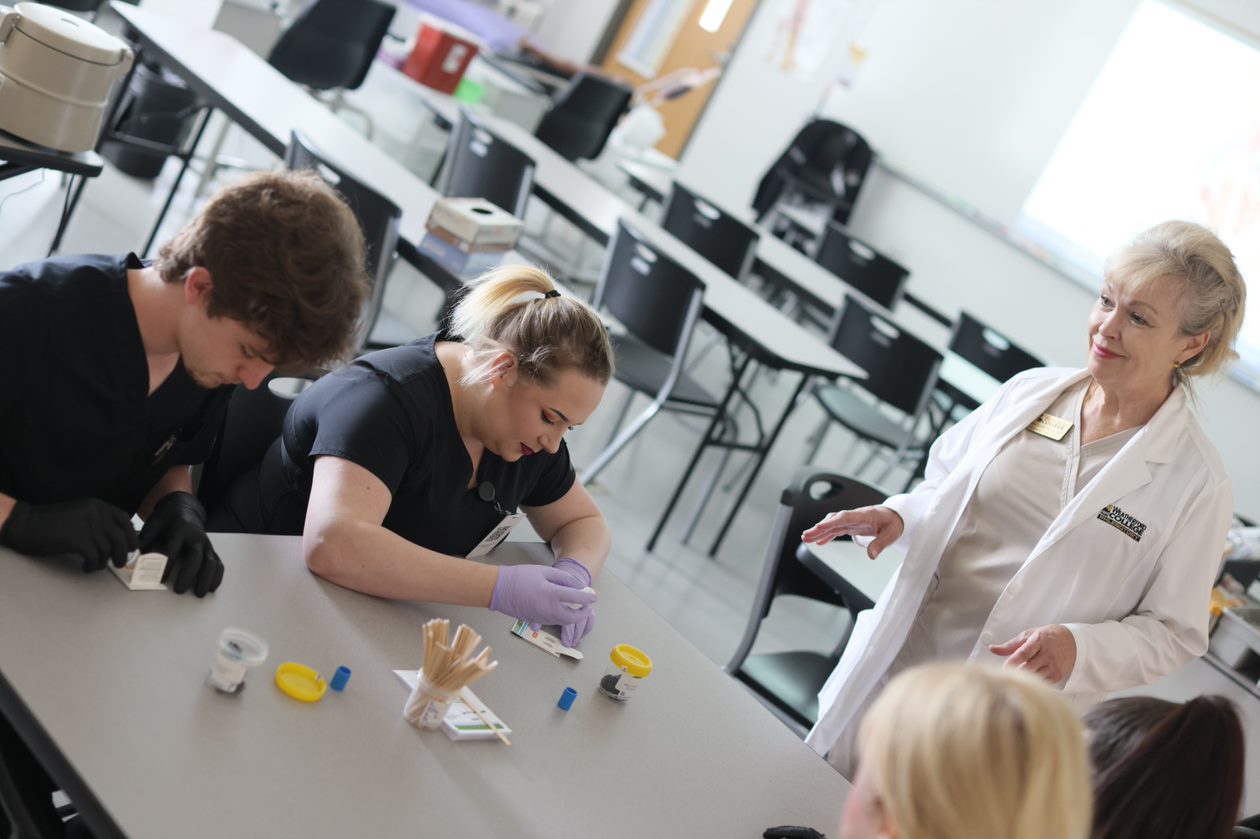Requirements
Health Sciences programs establish technical standards and essential functions to insure that students have the abilities required to participate and potentially be successful in all aspects of the respective programs. Students are required to meet technical standards and essential functions for the Phlebotomy Technology program as indicated below. Satisfactory completion of the PBT Program and successful employment following graduation demands your ability to meet the following requirements. If you are uncertain as to your ability with any of these essential functions, please consult with the PBT Program Director at 817-598-6466, or nmaniotis@wc.edu.
Ability to participate actively in all demonstrations, laboratory activities and clinical experiences in the professional program component. Such observation and information requires functional use of visual, auditory and somatic sensations.
- Observe laboratory demonstrations in which biological (i.e., body fluids, culture
materials, and cellular specimens) are tested for their biochemical, hematological,
and immunological components.
- Characterize the color, odor, clarity, and viscosity of biological, reagents, or chemical
reaction products.
- Employ a clinical grade binocular microscope to discriminate among fine structural
and color (hue, shading, and intensity) differences of microscopic specimens.
- Read and comprehend text, numbers, and graphs displayed in print and on a video monitor.
Sufficient motor ability to execute the movement and skills required for safe and effective performance of duties.
- Move freely and safely about a laboratory.
- Reach laboratory bench tops and shelves, patients lying in hospital beds or patients
seated in specimen collection furniture.
- Travel to numerous clinical laboratory sites for practical experience.
- Perform moderately taxing continuous physical work, often requiring prolonged sitting
or standing, over several hours.
- Maneuver phlebotomy and specimen acquisition equipment to safely collect valid laboratory
samples.
- Possess finger and manual dexterity necessary to control laboratory equipment (i.e.
pipettes, inoculating loops, test tubes) and adjust instruments to perform laboratory
procedures.
- Use a computer keyboard to operate laboratory instruments and to calculate, record, evaluate, and transmit laboratory information.
Ability to communicate effectively in English using verbal, non-verbal and written formats with faculty, other students, clients, families and all members of the healthcare team.
- Read and comprehend technical and professional materials (i.e. textbooks, magazine
and journal articles, handbooks, and instruction manuals).
- Follow verbal and written instructions in order to correctly and independently perform
laboratory test procedures.
- Clearly instruct patients prior to specimen collection.
- Effectively, confidentially, and sensitively converse with patients regarding laboratory
tests.
- Communicate with faculty members, fellow students, staff, and other health care professionals
verbally and in a recorded format (writing, typing, graphics, or telecommunication).
- Transmit information to clients, fellow students, faculty and staff, and members of
the healthcare team.
- Independently prepare papers, prepare laboratory reports, and take paper, computer, and laboratory practical examinations.
Ability to collect, interpret and integrate information and make decisions.
- Possess intellectual skills: comprehension, measurement, mathematical calculation,
reasoning, integration, analysis, comparison, self-expression, and criticism.
- Be able to exercise sufficient judgment to recognize and correct performance deviations.
- Apply knowledge to new situations and to problem solving scenarios.
Possess the emotional health and stability required for full utilization of the student’s intellectual abilities, the exercise of professional judgment, and the prompt completion of all academic and patient care responsibilities. Possess the emotional health and stability to develop mature, sensitive, and effective relationships with faculty, fellow students, clinical instructors, patients, and other members of the health care team.
- Manage heavy academic schedules and deadlines.
- Be able to manage the use of time and be able to systemize actions in order to complete
professional and technical tasks within realistic constraints.
- Possess the emotional health necessary to effectively employ intellect and exercise
appropriate judgment under conditions of physical and emotional stress.
- Be able to provide professional and technical services while experiencing the stresses
of task-related uncertainty (i.e. ambiguous test ordering, ambivalent test interpretation),
emergent demands (i.e. "stat" test orders), and a distracting environment (i.e. high
noise levels, crowding, complex visual stimuli).
- Be flexible and creative, as well as, adapt to professional and technical change.
- Recognize potentially hazardous materials, equipment, and situations and proceed safely
in order to minimize risk of injury to patients, self, and nearby individuals.
- Adapt to working with unpleasant biologicals.
- Support and promote the activities of fellow students and of health care professionals.
Promotion of peers helps furnish a team approach to learning, task completion, problem
solving, and patient care.
- Be honest, compassionate, ethical and responsible. Accept responsibility and accountability
for one’s own actions. The student must be forthright about errors or uncertainty.
The student must be able to critically evaluate his or her own performance, accept
constructive criticism, and look for ways to improve performance (i.e. participate
in enriched educational activities). The student must be able to evaluate the performance
of fellow students and tactfully offer constructive comments.
- Works within environments of cultural diversity: Works well with a variety of ethnic, social, or educational backgrounds.
Administrative Assistant, Health and Human Sciences
mellis-jackson@wc.edu
817-598-6217
